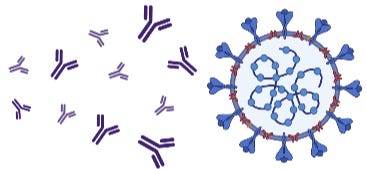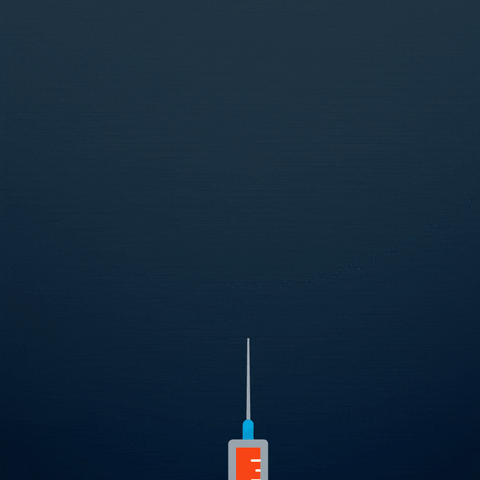In the last 15 months, we've experienced the outbreak of a global pandemic with unprecedented changes to every part of our daily lives. Attempts to adapt to this situation have created mass confusion, and the situation has people questioning everything. Many fear that they might get COVID-19 from the vaccine itself! (You won’t, and I explain why below).
The result? Record highs for 'vaccine hesitancy' and overall healthcare distrust. After a year of constant uncertainty and ambiguity, it's reasonable to have questions. But more than that, it is fundamentally reasonable to want to understand what is being injected into your body, and why.

Some of the most common hesitations about the COVID-19 vaccine are a desire to understand how it works, why scientists and doctors believe it's safe, and some internet-fueled fears that the vaccine will give you COVID-19.
So let's talk about this. Vaccines are not just the most cost-effective public health intervention humans have ever discovered, vaccines are also an incredible example of biology as technology.
Let's talk vaccines!
What makes a vaccine, a vaccine
Vaccines are defined by what they do: train your immune system against a specific disease. They not only prevent death but often prevent you from ever becoming sick. This is a big deal.
For example, the poliovirus. When most people contract the poliovirus the virus stays in the digestive tract until your body clears the infection. If this happens, you don't have symptoms. But sometimes, especially in young children, it gets out of the digestive tract and infects the central nervous system. When this happens polio causes a type of paralysis where your muscles can't contract. Death by polio is death by suffocation - patients die when the muscles for breathing stop working.

The development of the first polio vaccine by Jonas Salk(1) and the subsequent eradication of polio from many countries is a success story of modern medicine and biotechnology. Not only do vaccines prevent death, but also prevent long-term consequences (2).
In the case of COVID-19, the risk of death is linked to age, pre-existing conditions, and how overloaded the local healthcare system is (3).
Long-haul symptoms of COVID-19 are pretty common - studies have found that around one-third of patients (4). Unlike what you may expect, you don't even have to have symptoms from COVID to have these lasting side effects - nearly one-third of patients with long-haul symptoms started with asymptomatic infections (5).
Vaccines protect us from diseases by training our immune system to fight specific infections. Let’s start by understanding how your immune system fights COVID-19, and then how the COVID-19 vaccine contributes.
How your body fights COVID-19 without a vaccine
One of the ways your body fights COVID-19 is with antibodies, small proteins that your body produces. Your body can produce a lot of different types of antibodies - this is important to be able to fight lots of different diseases. However, there is a trade-off between producing a lot of different types of antibodies (you can fight a lot of different diseases), and being able to produce a lot of the right antibodies quickly (beat the infection faster). Your immune system addresses this through 'memory' of previously encountered pathogens (6).

One feature of antibodies is that they recognize the 3D structure of molecules really well. It's like a handshake: the left and right hands are anatomically identical but mirrored. When you shake someone's hand, you generally shake right hand to right hand (7). If someone offered you their left hand, you would know it immediately - even with your eyes closed. Antibodies do this on the molecular scale.
Once the antibody recognizes its target, it signals the immune system to come in and destroy. This is fundamentally the value of antibodies - they can find tiny amounts of pathogens in the body and destroy them before the pathogens have time to replicate and grow the infection. If you like to think of your immune system as a tactical strike force, that's pretty appropriate.
This process can go wrong - and when your immune system gets it wrong the outcome is often death. The longer it takes your body to find the right antibody, the more time the virus has to replicate and infect more of your cells.
Also, the immune system is good but there is always a cost. Sometimes your immune system kills some of your own cells in the process of clearing an infection. The more cells that have been infected, the more that might get destroyed in this process of clearing the infection. At a certain point, the body can't keep up and dies.
How vaccines change the way your body fights COVID-19
Step 1: Training
Without a vaccine, your body tries a bunch of different antibodies until it finds one that works. What if your body already had a memory of the right antibody? What if you could immediately start fighting the virus before the infection took hold? This would keep you from getting sick, and could even prevent it from spreading to others.


The COVID-19 vaccines currently approved in the United States (8) do NOT contain the actual virus. This is really important to understand:
The COVID-19 vaccines in the United States do NOT contain the COVID-19 virus.
It is impossible to get COVID-19 from these vaccines.
You might be wondering, if there's no virus in the vaccine, then where do the side effects of the vaccine come from? Great question - the side effects of vaccines actually come from your own immune system. Here's why:
The vaccine tells your body how to make the right antibodies to fight COVID-19. It does this by showing your body what the virus looks like; in response your immune system is activated and produces the antibodies, like it would for an infection*. This is why the common vaccine side effects are the same as for a mild and short infection*. It's mild because you are not actually infected, and short-term because you don't actually have an infection to fight, it's just while your body is making the antibodies.
Step 2: Exposure
If your body is exposed to COVID-19 after you've been vaccinated your immune system is prepared and already has the memory of antibodies. Your body quickly begins making those antibodies and fighting the infection. You fight it off quickly, without severe disease, and potentially even before you spread it to someone else.
That's it.
"But what about ____?"
This is a big topic, and we've only begun to scratch the surface. We still need to talk about some common questions about the vaccine, understand the different types of COVID-19 vaccines currently available, and WTF all those trial statistics mean.
Also, 👋 hey! At Canid (vaccine ops in a box for pediatricians!) and in my personal life, I have been talking to A LOT OF PEOPLE about vaccines. I'd love to talk to you too! I'm happy to discuss any questions or fears you have and promise no guilting or shaming. This is an important decision and I would love to help you find the resources you need to make the right choice for you.
Follow me on twitter @flumeleaper and send me a DM if you want to chat.
(1) Jonas Salk developed the first widely adopted polio vaccine in the early 1950's. In the early 1960's Albert Sabin successfully developed the oral polio vaccine. Oral vaccines can be difficult to develop, but there are clinical trials currently underway to test an oral COVID vaccine.
(2) A fascinating write-up about a man who relied on an iron lung to breathe for nearly 70 years.
(3) Remember “flatten the curve”? That's why we were doing it, to maintain hospital capacity and ensure that even more people didn't die from COVID-19.
(4) https://jamanetwork.com/journals/jamanetworkopen/fullarticle/2776560
(5) https://www.nytimes.com/2021/03/08/health/long-covid-asymptomatic.html
(6) If you think about it, this makes a lot of sense. The diseases you've had before are likely to be passed through your community, and getting re-infected many times would be bad for your survival.
(7) Boy scouts around the world are notorious for their left-handed handshakes. Before you laugh, the reason is actually pretty interesting.
(8) There are other vaccines in use (including other COVID-19 vaccines NOT currently approved in the United States) that do contain inactivated virus. This sounds scary but has been tested for decades. We'll talk about this more soon!








